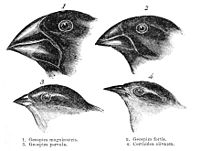
Photo from wikipedia
Fast-start predator-escape performance of mummichogs Fundulus heteroclitus was tested across field-informed gradients in temperature (24, 30, and 36 °C) and salinity (2, 12, and 32 ppt). Performance was similar across… Click to show full abstract
Fast-start predator-escape performance of mummichogs Fundulus heteroclitus was tested across field-informed gradients in temperature (24, 30, and 36 °C) and salinity (2, 12, and 32 ppt). Performance was similar across temperatures and salinities when fish were allowed to acclimate to these conditions. However, when mummichogs experienced acute temperature changes, performance exhibited thermal dependence in two contrasting ways. Fast-start turning rates and linear speeds varied directly with the temperature at which the maneuver was executed, but these aspects of performance varied inversely with acclimation temperature, with cool-acclimated fish exhibiting faster starts across test temperatures. These temperature effects were consistent across salinities. Altogether, our results suggest that while mummichogs increase performance with acute temperature increases, long-term rises in sea temperature may cause these fish to become more susceptible to predation during abrupt cooling events, such as when storm events flood shallow water estuaries with cool rainwater. This article is protected by copyright. All rights reserved.
Journal Title: Journal of fish biology
Year Published: 2020
Link to full text (if available)
Share on Social Media: Sign Up to like & get
recommendations!